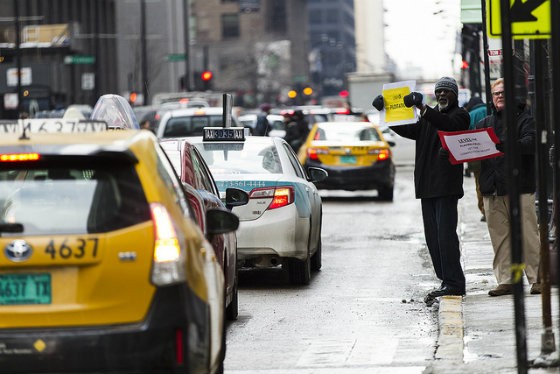Hopes were dashed Wednesday morning when the Metropolitan Taxicab Commission (MTC) failed to approve new regulations that would have been agreeable to companies like Uber, the online ride-hailing service.
So what happens next?
Here are four things that must occur for St. Louis to get Uber.
1) The MTC and Uber Need To Negotiate Face-to-Face
Incredibly, this hasn't happened yet. The two parties have only communicated on the phone and through proxies. Let's ignore whose fault that is for now. Everybody seems to have concluded at this point (albeit for different reasons) that it's time to get this thing done.
According to Mary Ellen Ponder, Mayor Francis Slay's chief of staff, the taxi commission is meeting with reps from city and county this afternoon. The goal is to get the commission and its appointing authorities -- Slay and County Executive Steve Stenger -- all on the same page. Then, she says, the plan is sit down with Uber sometime next week -- in person.
2) Forget the Personal, Focus on the Policy
Ad hominem attacks like "insufferable douche" and "corrupt cowards" make for great news copy -- so, thanks, guys! -- but amount to dead-end diplomacy.
Ponder says she sees a lot of agreement from both sides on what a revised code would look like. The basic issues that still need to get resolved include: Whether aspiring drivers should have to submit to drug and physical fitness tests; whether Uber's liability insurance coverage is adequate; whether the MTC will continue to cap the number of new drivers; and whether Uber can apply for a sort of group license that will cover all its drivers. Ponder sounds hopeful on all these points.
Then there are the fingerprints.
3) The Law Requiring Fingerprint-Based Background Checks Must Change
Uber has never wavered on this point: It will not enter the St. Louis market if its drivers are forced to get background checks that include fingerprints. The problem there is that those checks are mandated by state law.
Reasonable people can and do disagree on whether the MTC's fingerprint checks, which go through the FBI and Missouri State Highway Patrol, really keep riders that much safer than Uber's background checks, which run through an online service called Checkr.
Regardless, state law is state law. Slay has already pledged a willingness to lobby the General Assembly to modify that law when legislators return to Jefferson City in January.
The big question: In the meantime, can the MTC and Uber agree to some kind of provisional license so Uber can get started?
The city has signaled its openness to temporarily waive the fingerprint requirement by asking the St. Louis Metropolitan Police Department to evaluate Checkr and determine if its service is effective enough to fulfill the spirit, if not necessarily the letter, of the law.
We'll see what happens. We're hearing from all sides that this is the single biggest hurdle keeping Uber out of St. Louis for now -- and that it will very likely be resolved, one way or the other, within the next two or three weeks.
4) Everyone Needs to Chill Out
This is not Israel-Palestine, or an Iran nuclear deal. Geopolitical peace is not in the balance.
It's fine to be convinced that you're right. It's less productive to automatically assume that every word or deed of the other side is motivated by bad faith. That goes for both camps.
This is a wonderful opportunity for Uber to show some flexibility in its quest to make money here, and an opportunity for the MTC to prove to us that it's not just a gang of protectionist luddites. May both sides show their best sides.
We welcome tips and feedback. Contact the writer via email at [email protected].


